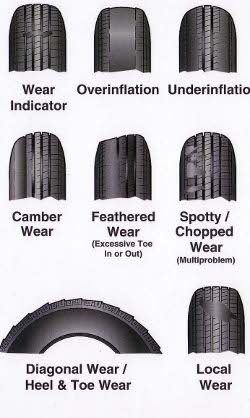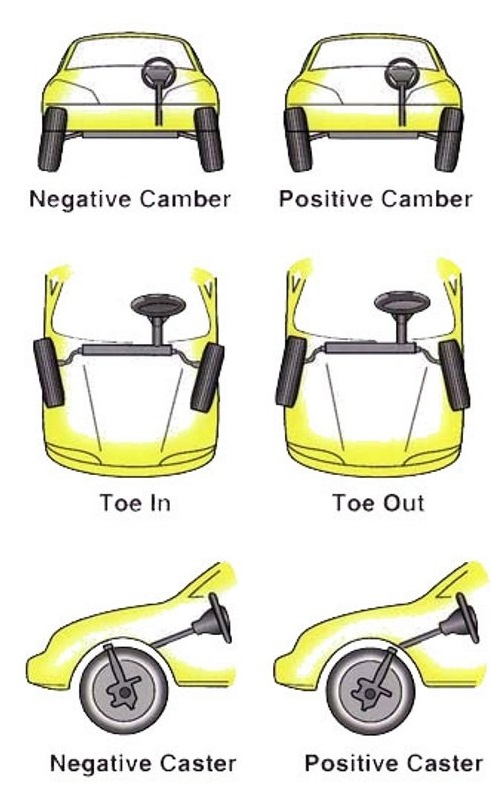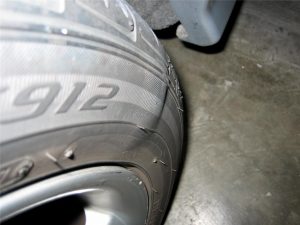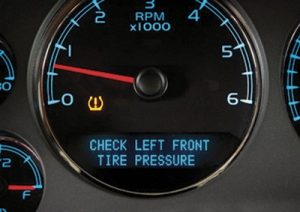You can hear a tire squeal when turning corners if:
- They are underinflated.
- They are worn out or wear unevenly.
- The wheels are misaligned.
- There’s an issue with the wheel, steering, and/or suspension elements.
Tires squeal as rubber scrubs off while trying to find traction during hard braking, cornering, or accelerating. If the issue is severe, you will hear the same sound even when turning gently. However, there might be no issue if you notice squealing when trying to fit on a parking lot, especially if there are newly painted areas. The surface is stickier, and you have to perform tight-radius turns there at low speeds. The tires will generate a squeaky shoe-like sound, and this is usually not a problem.
In most other cases, there’s an issue with the tires, wheels, suspension, etc.
Tire Squeal When Turning Corners: Common Causes
Under-Inflation
Lack of air pressure in the tire will make it more flat, vulnerable to damages and flexes. This also makes the traction capabilities of the tire worse. As you turn, there isn’t enough resistance to the physical forces within the tire, so it tries to find the right amount of road contact. The rubber slides sideways due to the item’s inadequate form, making the tire squeal when turning corners.
The lack of air pressure may be due to a leak, when one of the tires loses more pressure than the others. Such tires have to be repaired if possible or replaced. Also, lack of maintenance may be the cause of under-inflation. All tires lose air over time due to the process of osmosis, so every 1,000 miles, every month, or even every week, you should check the inflation rate of your tires.
The frequency of inspections depends on the roads you drive, the age of your tires, and your driving style. However, if you manage to control air pressure in the tires, you prevent uneven wear, decrease the risk of blowout or flat tire, and prolong the tires’ lifespan.
Regular and Uneven Treadwear
 Tire tread is what provides you with enough traction, and the lack of it makes a tire squeal when turning corners. Tires are legally considered bald and dangerous at 2/32” tread depth. However, traction loss may become noticeable at 5/32”. As your tires reach 4-3/32”, you should start searching for a new set, as your current tires will already be unsafe and noisy.
Tire tread is what provides you with enough traction, and the lack of it makes a tire squeal when turning corners. Tires are legally considered bald and dangerous at 2/32” tread depth. However, traction loss may become noticeable at 5/32”. As your tires reach 4-3/32”, you should start searching for a new set, as your current tires will already be unsafe and noisy.
As to uneven wear, it may make your tires squeal much earlier. The point is that only a portion of the tire wears prematurely in this case, and the difference in tread depth becomes quite noticeable even at the rate of 1-2/32”. Irregular tire wear also indicates a number of issues with the alignment, wheel and suspension part damage or wear, etc. All these problems may make the sound and the tire condition even worse.
To avoid uneven wear that may make a tire squeal when turning corners, inspect your tires regularly. Check the balance of the tires, wheel alignment, tire pressure, suspension and wheel condition, etc. Also, don’t forget to rotate the tires to achieve even weight distribution within the set.
Wheel Misalignment

The camber and toe settings of wheel alignment are responsible for the position of the wheels towards the ground and one another. If at least one of these goes off, the tires may start to wear unevenly and touch the road at a wrong angle. This may create a plethora of irregular noises, including a tire squeal when turning corners.
The suspension position may go off when you hit a large road curb or a pothole. Also, it may be out of alignment if a mechanic that performs the tire rotation or installs new wheels/suspension breaks the three settings.
It’s important to remember that wheel alignment differs from tire balancing, as many people confuse the two procedures. One deals with suspension positioning, while the other – with weight distribution within a tire.
Non-Tire-Related Issues
Such issues include:
- Damaged belt.
If the sound of a tire squealing when turning corners increases with the speed, the engine belt may be worn out or damaged. It may become one of the causes of the power steering pump malfunction. The main sign of the degrading condition is a heavy steering wheel. - Faulty wheel bearing.
Faulty or worn out bearings or axle may create friction that will cause a squealing sound. The bearings usually act like a pillow between the axle and the wheel. So, if you neglect to change them regularly, they may cause a grinding sound and make other close elements deteriorate faster due to vibration. - Dry steering/suspension element.
If the steering and/or suspension elements need lubrication, they may make a sound like a tire squeal when turning corners. The components that may contribute to the noise include tie-rod ends, ball joints, seals, bushings, and bearings. - Loose wheel.
Loose wheel lugs and/or covers will cause friction between the enveloping part of the tire and the wheel surface it covers. This may cause squealing noises as you turn. Wheels may go loose as you hit a road hazard or visit an unexperienced mechanic. - Worn brakes.
Squealing and squeaking may come from metal-to-metal friction of the brakes. Most often, it’s the brake pads that are worn out. If you’re not sure what kind of sound you hear but you think the brakes are the key to the issue, you can decipher the sound meaning. - Low power steering fluid.
If you hear a tire squeal when turning corners, this may be due to the lack of power steering fluid. In this case, the noise will come out once you turn the steering wheel. In such a case, check for a power steering fluid leak, which looks like stains of a pink or red substance.
These problems aren’t related to the tires, yet they can make them squeal. Also, some of the causes may generate the squeal within the wheel or suspension, which may be confused for tire noises.
Tire Squeal When Turning Corners: Solutions
Eliminating all possible causes of tire squealing include:
- Regular pressure checks.
- Driving habits control.
- Proper tire maintenance routine.
- Proper vehicle maintenance routine.
Regular Pressure Checks

Air pressure is one of the most important things to track, as it’s easily lost. One nail caught by the tire, and air leak is almost inevitable until you notice the issue. Once you do, it may already be too late, as if a tire is deflated by 25%, it’s considered dangerous to ride on. The likelihood of a tire-related crash increases three times in such a case.
For a standard light-weight tire with a recommended pressure of 30 psi, 25% will be 7.5 psi. When a tire leaks, it may lose up to 3 psi a day without blowing out. Two days of such a ride, and the tire is already unfit for its purpose, which is much worse than tire squeal when turning corners. Even if you re-inflate it later on, remember that it might have been damaged. The sidewalls may have folded a couple of times, creating an internal cut. It will look like a bulge from the outside, meaning air is trying to escape the tire through the cut.
How to Check Tire Pressure

There are two main ways: using a pressure gauge or the tire pressure monitoring system (TPMS).
You can buy a pressure gauge almost at any tire shop, it will cost you about $5. The TPMS will show you if there’s an issue itself. If the pressure is lower than 25%, the system shows you a sign, detecting which tire has a problem. This system is required in all vehicles manufactured after 2007.
Driving Habits Control
You may hear a tire squeal when turning corners, braking, or increasing speed. This may be the case because of your driving habits. To make sure your steering, suspension, wheels, and tires last longer, make sure to avoid hard maneuvers like the following if possible:
- Rapid accelerating.
When you try to increase the speed of your vehicle rapidly, the tires start to spin faster and lose traction temporarily. At this point, some of the rubber scrubs off the tire, leaving you with less tread depth to use and continuing squealing noise. Besides, the temperature also increases quickly, which may cause tire aging prematurely. - Hard braking.
Hard braking will cause the same sound and rubber scrub-off, but vice versa. The tires will cease rotating quickly, but they will continue sliding on the road for some time. This may cause severe uneven wear which will contribute to the squeal. - Hard cornering.
As you change the direction of your vehicle, the tires slip a little bit trying to keep traction. If you do it fast at high speeds, the difference between the tire and car direction point will make all or one tire squeal when turning corners.
Proper Tire Maintenance Routine
The main tire maintenance includes:
- Tire balance checks and rebalance if needed.
Tire balance will make the weight distribution within the tire even, as small weights are put on the rim opposite the stiffer rubber spots. Consider tire balancing every 3,000-6,000 miles, it will cost about $6-$20 per tire. - Tire rotation.
Tire rotation helps distribute weight evenly on all tires, as they are put from side to side, axle to axle. Consider rotating your tires every 5,000-8,000 miles, it will cost $25-$120, depending on the tire shop or dealership. - Wheel alignment.
Wheel alignment fits the suspension according to the three angles: camber, caster, and toe. This adapts the wheel position towards the ground and other wheels, as well as of the steering axis to the ground. Consider wheel alignment every time you inspect the vehicle or replace suspension parts. It will cost about $50-$75 for the front wheels, $100-$150 for all four wheels if you need a single alignment, or about $200 for a service warranty.
Proper Vehicle Maintenance Routine
Drive to an auto shop every 6 months or annually to check the condition of the engine, steering, suspension, as well as other important car parts. Every part has its own life expectancy, and you should know at least some of them to replace them in time. If you don’t, the parts that may wear out can make a tire squeal when turning corners or generate similar noises themselves. Also, do not forget about the choice of quality tires from brands that have proven themselves in this business, such as: Milestar tire, Solar, Nexen and etc.
For example, shock absorbers last about 4-5 years if the vehicle is regularly used. Wheel bearings may last up to 10-15 years (or about 120,000-150,000 miles) if you drive carefully. The control arm assembly usually lasts up to 100,000 miles or about 10 years.
However, this doesn’t mean you don’t have to worry about your car for a decade. All these parts tend to wear prematurely if you are a harsh driver or if you drive on bad roads/off-road. Some elements also react to extreme temperatures, drying prematurely.
A vehicle inspection will cost you about $100.
